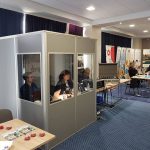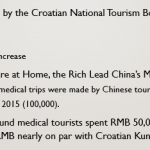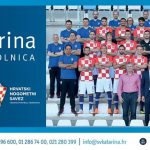November 12, 2018 – One of the many things I love about my job running Total Croatia News is that there is so much to cover in this beautiful country, and each day brings a new surprise and opportunity for learning.
It is now more than a year since I was alerted to the quality of the very best in Croatian health tourism. St Catherine Specialty Hospital, a Leading Hospital of the World and recent European partner with Mayo Clinic for the new OneOme RightMed pharmacogenetic test; Bagatin Clinic, named the best dermatology clinic in Europe to add to a host of dental awards; Svjetlost Eye Clinic, a regional leader attracting Hollywood stars from California. The list goes on. You can read more about my early discovery of health tourism in Croatia here.
All this led me to a specialised workshop at Bagatin Clinic last Monday, where global medical travel branding guru Ilan Geva spent the day with industry leaders discussing the branding of Croatian medical tourism. It was a very thought-provoking day for all involved, and it was – for me – the first mention of an Asian country which was apparently setting the standards in medical tourism worldwide. As I noted in my report on the seminar:
A little online research, and it seemed that everyone was talking about Malaysia – the Facebook page of International Medical Travel Journal last week was quoting the Malaysian Prime Minister.
Three days after Ilan Geva’s seminar in Zagreb, I found myself taking him up on his suggestion to come down to Crikvenica to see how the Kvarner Health Cluster was doing things. One of the keynote speakers at the Crikvenica International Health Tourism conference was Keith Pollard, Editor in Chief of IMTJ, who kindly agreed to an interview with TCN (you can read it here). He also had some rather nice things to say about Malaysia:
It was time to meet Malaysia…
I have been to a lot of conferences in my life, but I was not quite prepared for what happened next. Sherene Azli, CEO of the Malaysian Healthcare Travel Council (MHTC) gave a presentation called Experience Malaysian Healthcare, Embrace Malaysian Hospitality.
She put on quite a show.
Before we get to Sherene’s presentation, one of the best moments of the first day of the conference was Sherene’s explanation of this slide, above.
“I am probably the only Muslim in the room,” she said. “But I want to share something with you regarding hospitality. On the left in the photo above is what greeted me in my Crikvenica hotel room – qibla, prayer mat and Koran. And on the right – halal breakfast options. I have only had that once before in 60 countries of travel – last year at the Hilton in Zagreb. Thank you Croatia, I have learned something that we can implement back in Malaysia.”
It was a beautiful and humble moment for me – here was the market leader coming to help a country trying to establish itself on the market, but humble enough to recognise and emerge from the experience with a learning experience of its own. I was beginning to have warm feelings for Malaysia…
How many people know where Malaysia is? Croatia is obviously not a target market for Malaysia for medical tourism, or for Croatians for tourism in general, but I felt a little embarrassed that I could not quite pinpoint Malaysia on the map. But what followed has had me researching Malaysia a lot since.
For this is a country which has REALLY got its act together, bringing all its key institutions together for the greater good – the promotion of Malaysia as a medical tourism destination. After her very impressive presentation, I asked Sherene how Malaysia did it and how it all started:
It started maybe 15-20 years ago, but on a very small scale. Back then Penang was a destination for Indonesians. But back then, the trend was more outbound – Malaysians would travel to places like Singapore to get treatment. But once we noticed Indonesian visitors coming to Penang for treatment, we noticed perhaps the potential to develop this sector of tourism.
So in 2009, we set up the Malaysia Healthcare Travel Council, as a department in the Ministry of Health. By 2011, it was made into a corporate body. It is like a private body, but I report to ministers. It used to be the Minister of Health, but now it is the Minister of Finance.
The mandate was twofold – facilitation of the industry and then the promotion. So before we could start selling what we had, we had to get the facilitation right. MHTC has been doing that since 2011, looking at tax allowances, how we build the infrastructure, how we encourage development with the different states of Malaysia. I gave the example of Penang in my presentation, but we work with all the different states in Malaysia.
After we did all the planning for the facilitation, we embarked on promotion. For Malaysia, one of the challenges is that our currency is quite weak. So when we want to promote internationally, it is very costly. In China, for example, a simple campaign can cost US$1 million, and we don’t have that money.
So what we have done is to collaborate with Malaysian agencies on the ground such as Tourism Malaysia or investment organisations like the Malaysian External Trade Development Corporation. It is very expensive for individual hospitals to go out and promote, so we help with the coordination. So the private sector invests in a more cohesive manner, and we have a culture of cooperation and competition. Focus on marketing the destination – Malaysia – first and foremost, then build your brand as an individual hospital or clinic. So that has been our strategy, and we have made a lot of progress since 2011.
Now EVERYONE wants to be in medical tourism, and the competition is strong. The bar was already high, but now it must go higher.
And here we are in Croatia. How did you get here?
It is actually my second time. I was invited to speak at a conference in Opatija last year. I was invited to speak at CIHT 2018 to share our experiences in Malaysia, and I am delighted to be here. It is a very beautiful country.
I am quite new to the medical tourism scene, and I don’t have your experience or perspective. Tell me about Croatian medical tourism from your perspective – how is it doing?
Croatia has a very rich tourism history, dating back to the 19th century I think. Regarding medical tourism, there is big potential, but unless you can get everyone working together, the results will be very fragmented. Whether you like it or not, Kvarner Health Cluster is doing a great job promoting this region, but it may seem to be in competition with other regions in Croatia by doing that.
If you are promoting Croatia, and one region in particular is promoting itself, it is then competing against other regions, and that can be a waste of resources. All the stakeholders should be working together. In Malaysia 90% of my job is working with the stakeholders towards a coordinated approach.
This is my fourth year in the job, and I realised that if it was going to work, I needed the support of the main stakeholders. So I went to see them and asked them to support me in my decisions, or this was not going to work. It has not been easy, but we are making progress.
Coming back to Croatia, what is the reputation of Croatia’s medical tourism industry? Does it have one?
When it comes to medical tourism in Eastern Europe, there are two countries which always come up – Croatia and Hungary. So the good news is that you are in the top two, but then I hear about Kvarner and other things, and I get confused – where is the focus? That’s my perception. I may be wrong, but that is how it comes across to me.
So it is fair to say that Kvarner almost has a bigger brand than Croatia for health tourism?
Yes, definitely. Which is good news for Kvarner or course. But looking at Malaysia, perhaps it is similar to how Penang was at the beginning. But one thing we realised very early on in Malaysia is that everyone can benefit. You don’t have to fight. I was given a mandate to bring everyone together for the benefit of Malaysia and the health tourism sector, and that is what I am working very hard to do.
(Perhaps Malaysia’s best medical tourism ambassador – its 93-year-old Prime Minister who had a double heart bypass when he was in his 60s and 80s. In Malaysia of course…)
To learn more about medical tourism in Malaysia, visit the MHTC website here.
To follow TCN coverage of health tourism in Croatia, click here.










